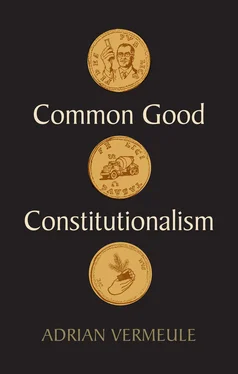Chapters 1and 2together lay out a positive vision of common good constitutionalism, both generally and as an approach to our own constitutional order in particular. Chapter 1offers a general, positive definition of the common good, a sketch of common good constitutionalism, and an account of its basic contours, premises, and commitments. Chapter 2then turns to our own constitutional order, beginning with the ius commune – the rich stew of Roman law, canon law, and other legal sources that formed the matrix within which European legal systems developed – and its relationship to Anglo-American law. That relationship is much closer than many American lawyers realize, partly because of a tradition in Anglophone legal theory of cheerleading for the exceptionalism of the common-law tradition.
Chapter 2then turns to a series of demonstration projects involving both justification and fit. They aim both to put common good constitutionalism in its best light, and also to show how deeply influential the classical tradition has been on the foundations of our constitutional order. I discuss the law of due process and economic regulation in detail, arguing that the first Justice Harlan’s dissent in Lochner v. New York (1905) 40amounts to a model judicial opinion for common good constitutionalism, and that the Court’s deferential due process jurisprudence in the area of social and economic regulation generally embodied the classical idea of determination. I then turn to Dworkin’s favorite interpretive chestnut, Riggs v. Palmer , 41the “Case of the Murdering Heir,” showing that a certain type of interpretive textualism is itself justifiable in terms of the common good, and that such textualism is in fact built into the classical legal tradition. That classical version of textualism has built-in limits, however: general legal principles drawn from the ius naturale and the ius gentium may be used to clarify and construe ambiguous positive texts. Finally, I examine the famous opinion in United States v. Curtiss-Wright Export Co. , 42showing that and how the Court drew upon the classical legal tradition to interpret the fundamental nature of American sovereignty, the powers of the presidency, and the role of the ius gentium in our constitutional order.
Chapters 3and 4turn to recent American law and legal theory. I examine the main competitors of common good constitutionalism: originalism, until recently the all-but-official view of the conservative legal movement, and progressivism, still the dominant ideology of the legal academy by sheer weight of numbers. Chapter 3argues that originalism, the main competitor to common good constitutionalism on the American scene, is an illusion. It exists primarily as a rhetorical posture and an implicit, but only intermittently acknowledged, set of normative commitments. Originalism lacks the internal theoretical resources required even to identify meaning without normative argument at the point of application, most obviously and explicitly in hard cases, but necessarily in all cases. In courts, for example, originalist decisions are pervaded by commitments of political morality that judges use to decide legal questions. It follows that originalism, in this sense, does not actually exist. I illustrate the point with recent decisions from our putatively originalist Supreme Court, including Bostock v. Clayton County, Georgia , 43which interpreted Title VII of the 1964 Civil Rights Act 44to cover sexual orientation and gender identity, and Seila Law v. CFPB , 45which invalidated the independence of the Consumer Financial Protection Bureau. These decisions can only be described as Dworkinian, despite the contrary self-conception of their originalist authors. The Justices are speaking fit-and-justification without knowing it.
Chapter 4turns to progressivism. Here my basic aim is to show that progressivism presupposes a particular and contestable vision of the good, and to show that a non-originalist, common good approach to constitutionalism need not presuppose that vision. Like originalism, progressivism emphatically works with an unacknowledged vision of the good, but the progressive illusion takes a different form; progressives take themselves to simply be liberating individuals from the unchosen bonds of tradition, family, religion, economic circumstances, and even biology. This is, of course, just another very particular account of human flourishing, and it is a wildly implausible account. The answer to progressivism’s liberationist theory of the good is not to pretend that the law can be identified independent of morality, the answer given by originalism. Instead the answer is to understand that law flourishes as law when it incorporates, not liberationism whether of the economic or sexual varieties, but genuine concern for the common good at ever higher levels – individual, family, city, nation, and commonwealth of nations.
I also rebut the widespread assumption that an organic, developmental vision of constitutionalism must be a progressive vision. A tendentious slogan of originalists is that “classical constitutionalism is just another type of living constitutionalism.” But it is perfectly possible to have a developing constitution that adapts basic principles to changing situations in order to promote the common good over time, without subscribing to a Whiggish “living constitutionalism” that promotes individualism, radical autonomy, and identitarian egalitarianism – the aims of the progressive movement in the Anglophone world.
Accordingly, I draw upon John Henry Newman’s idea of the “development of doctrine” to distinguish developing constitutionalism from progressive constitutionalism. Under developing constitutionalism, natural legal principles remain constant even as interpreters unfold the implications of those principles and apply them to new circumstances over time, whereas under living constitutionalism the law is instrumentalized to promote an ongoing agenda of progress. To illustrate both possibilities I offer a trio of examples: Obergefell v. Hodges , 46 Euclid v. Ambler Realty , 47and an international declaration of pro-life principles from 2020 called the Geneva Consensus. 48The first is a paradigm of progressive instrumentalization of the law. The second and third illustrate healthy doctrinal development in the direction of solidarity and community. The key point here is that nothing in a developing, organic account of constitutionalism necessarily presupposes or requires a progressive theory of the good for human beings, with a paramount emphasis on individual autonomy.
Chapter 5offers illustrative applications of common good constitutionalism in various domains: the administrative state and deference to agencies; problems of subsidiarity and federalism; and then finally the theory of rights, such as the freedom of speech. I approach these topics partly as a matter of normative justification but partly also as a matter of fit 49– suggesting, in other words, that our law is and always has been susceptible of being read in light of the common good. The amnesia of our law about the classical tradition does not at all mean that law’s intrinsic nature has been wholly abandoned. On the contrary, I suggest that the centerpiece of our operative constitutional order, the administrative state, is structured and suffused by principles of legality that order it to the common good.
I take particular pains to dispel the mistaken assumption that common good constitutionalism is incapable of recognizing rights. Under common good constitutionalism, rights very much exist, but are grounded and justified in a different way than under standard autonomy-based liberal theories. Common good constitutionalism does not aim to maximize the autonomy of each person or citizen, subject to the like autonomy of all; that is antithetical to the idea of a genuinely common good. But the classical legal tradition has a rich account of rights, rooted in the basic idea of ius as what is due to each. On this account, rights exist to serve, and are delimited by, a conception of justice that is itself ordered to the common good. It is definitely not that the common good “overrides” rights; rather it defines their boundaries all along. Liberty on this conception is taken to be a bad master, but a good servant. Common good constitutionalism makes no fetish of Liberty, but protects liberties as component parts of the common good and contributors to it.
Читать дальше












